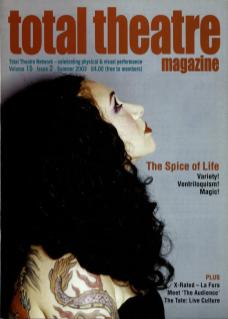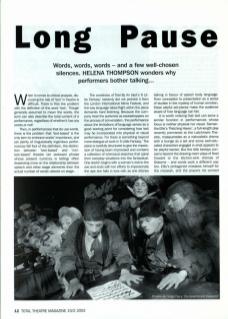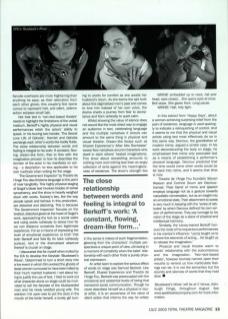When it comes to critical analysis, discussing the role of 'text' in theatre is difficult. There is first the problem with the definition of the word 'text'. Though generally assumed to mean the words, the term can also describe the total content of a performance, regardless of whether it has any words or not!
Then, in performances that do use words, there is the problem that 'text-based' is the only term to embrace words' importance, and yet plenty of linguistically ingenious performances fall foul of the definition, the distinction between ‘text-based' and 'non-text-based' theatre (an awkward phrase whose present currency is telling) often depending more on the relationship between speech and other stage elements than the actual number of words uttered on stage.
The wordiness of Told By An Idiot's A Little Fantasy certainly did not prohibit it from the London International Mime Festival, and the way language takes flight within the piece demands hard listening. Because the company treat the audience as eavesdroppers on the process of conversation, this performance about the limitations of language serves as a good starting point for considering how text may be incorporated into physical or visual performance. For there is something beyond mere dialogue at work in A Little Fantasy. The piece is carefully structured to give the impression of having been improvised and contains a collection of whimsical sketches that spiral from everyday situations into the fantastical. One sketch begins with a woman's visit to the zoo and ends with her efforts to impersonate the ape she falls in love with as she ditches talking in favour of apeish body language. From conception to presentation as a series of studies in the mystery of human emotion, these playful set-pieces make the audience aware of how language can fail.
It is worth noticing that text can serve a similar function in performances whose focus is neither physical nor visual. Samantha Ellis's Patching Havoc, a full-length play recently premiered at the Latchmere Theatre, masquerades as a naturalistic drama with a lounge as a set and some well-educated characters engaged in what appears to be playful banter. But the title betrays concerns beyond the drawing room plays of Noel Coward or the kitchen-sink dramas of Osborne – and words work a different way too. Ellis' protagonist mistakes himself for the messiah, and the prayers his worried fiancée overhears are more frightening than anything he says; as their alienation from each other grows, this couple's first home comes to represent hell, and silent, solemn action eclipses small talk.
Not that text in 'non-text-based theatre’ needs to highlight the limitations of the verbal medium. Berkoff's highly physical and visual performances relish the actors' ability to speak. In his touring two-hander, The Secret Love Life of Ophelia, Hamlet and Ophelia exchange each other's words like bodily fluids. The close relationship between words and feeling is integral to his work: ‘A constant, flowing, dream-like form, free to flow with the imaginative process’ is how he describes the domain of the actor in his manifesto on acting – a description no less applicable to his own methods when writing for the stage.
The Government Inspector by Théâtre de l'Ange Fou also thickens language to the point of near tangbility. This highly physical staging of Gogol's bleak text involves tirades of verbal sycophancy, and the show is heavily weighed down with words. Society's lies, like the way people speak and behave in this production, are distorted and distorting. This is because The Government Inspector focuses on the twisted, distorted greed at the heart of Gogol's work, approaching the text as a social satire and using words ruthlessly to stress how far we can distance ourselves from legitimate experience. For as a means of expressing the truth of emotional experience (a truth that both Berkoff and Told By An Idiot ruthlessly pursue), text or the dramatised absence thereof is crucial on stage.
I discovered this for myself when invited by the ICA to develop the fairytale Bluebeard's Wives. Determined to turn a short story into a live event in which film evoked the ghosts of dead women rumoured to have been killed by their much married husband, I set about trying to justify the use of text. I tried to work out what character alone on stage could be motivated to tell the fairytale of the bluebearded man and his newly wedded young wife. The solution I hit upon was to put the story in the mouth of the bride herself, a lonely girl turning to words for comfort as she awaits her husband's return. As she learns the sad truth about this stigmatised man's past and comes to love him instead of her own voice, the drama charts a journey from fear to acceptance and from verbosity to quiet calm.
Whilst showing the value of silence does not sound like the most direct way to engage an audience in text, celebrating language and the multiple narratives it shouts can amount to the same thing in physical and visual theatre. Dream-like forays such as Shared Experience's After Mrs Rochester weave fiery narratives around characters who dwell in each others' heated imaginations. This show about storytelling amounts to nothing more and nothing less than an angry collection of rants against the meaninglessness of existence. The show's strength lies in the sense it makes of such fragmentation, gleaning from the characters' multiple perspectives a unique point of view, climaxing in a moment of complicity when the tales' relationship with each other finds a purely physical expression.
An artist keen to explore the serious effect of words on stage was Samuel Beckett. Like Berkoff, Shared Experience and Theatre de l'Ange Fou, Beckett was preoccupied with the emotional and existential levels of being that transcend social communication. Though he never described himself as a physical or visual artist, it is an awareness of the value of silent action that informs the way he writes:
WINNIE embedded up to neck, hat and head, eyes closed... She opens eyes at once. Bell stops. She gazes front. Long pause.
WINNIE: Hail, holy light.
In this extract from Happy Days, about a woman achieving surprising relief from the pain of existence, language is used sparingly to indicate a relinquishing of control. And it seems to me that the physical and visual artists using text most effectively do so in this same way. Decroux, the grandfather of modern mime, argued a similar case. In his work deconstructing the body on stage, he emphasised that mime only precluded text as a means of establishing a performer's physical language. Decroux predicted that the time would come when words would be let back into mime, and it seems that time is now.
Théâtre de l'Ange Fou founders Steven Wasson and Corinne Soum are Decroux-trained. Their blend of mime and speech employs language not as a gesture towards naturalistic conversation, but as an insight into an emotional state. Their attachment to words is very much in keeping with the 'series of attitudes' by which Decroux defined his own version of performance. They pay homage to his vision of the stage as a place of physical and intellectual harmony.
Similarly, the Lecoq-trained Berkoff honours the roots of his loquacious performances in his mentor's influence: ‘Lecoq taught us to cohere the elements of acting... He taught us to release the imagination.'
Physical and visual theatre warm to words' relationship with the subconscious and the imagination. ‘Non-text-based artists', however clumsily named, open their mouths to remind us how inarticulate feelings can be. It is not the semantics but the sounds and silences of words that they hold dear.
Bluebeard's Wives will be at C Venue, Edinburgh Fringe, throughout August. See www.spidtheatrecompany.com for more information.


